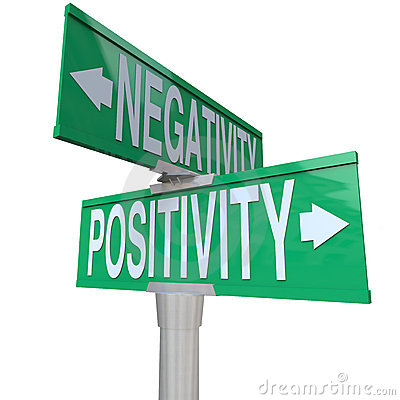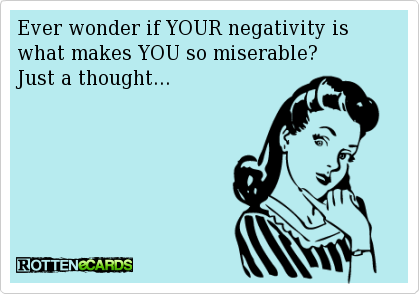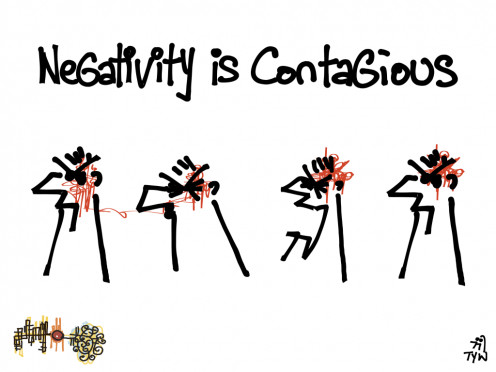Understanding and coping with the ill-effects of negativity


By Michelle Liew Tsui-Lin

Overcoming anger and resentment - Anthony Robbins
“It is not what happens to you that matters it is how you feel about it that does.”
― Shannon L. Alder
Shannon L Aider, the author of successful books on relationships such as 300 Questions LDS Couples Should Ask Before Marriage and 300 Questions A Couple Should Ask For A More Vibrant Marriage, phrased well how we should deal with the negativity and curveballs that will sometimes hit, whether we want them to or not.
Negativity is ill-feeling that, should we want, can cease to be part of our lives. Our perspective of situations, however negative, can determine our states of mind and health.
Negativity, when present in large amounts in the mind, can have ill-effects that can be detrimental to one’s well being, be it on health, body, or mood. Knowing the causes of negativity can help us to deter it. Positivity, naturally, would lead to better health and happiness.


What causes negativity?
Limiting beliefs
Some of us may have the misfortune of being brought up in an environment where negative beliefs are inculcated. They may have been told that they are “useless”, “worthless”, or simply made to feel that their presence does not amount to anything. In certain cases, verbal abuse might cause limiting beliefs or in worse situations, make a person feel as if he or she has no right to any form of positivity or esteem.
Negative people
Some of us may be surrounded by negative family or friends. They constantly reiterate their negative feelings and cause a person to feel the same. That naysaying attitude can easily become a part of one’s life and psyche.
Negative environment
A negative environment where ill-circumstances are a norm will cause one to belief that they are cycles that are difficult to break out of. It is natural for a person to assume that he or she has no power to make changes. Belief that one is powerless over the environment will inculcate less than positive attitudes.
The grass-is-always-greener attitude
Constantly reminding oneself that one could be better off in another circumstance would encourage feelings of dissatisfaction that cause negativity. Always comparing oneself to others will also lead one to feel discontent, jealous and have a cynical attitude towards the possibility of positive change.


The effects of negativity
Negativity has ill-effects on the mind, body and spirit. In short, one becomes ill because they think they are. It is toxic and has less than desired consequences.
The placebo and nocebo effects
Many of us may have heard of the Placebo effect. Patients in clinical trials are lulled into thinking that they are benefiting from a new drug or surgery when they are actually getting false treatment.
Unethical as it may seem, Placebo actually has some positive effects. Thinking that a drug is working positively on them causes the dilation of the bronchi, lowers blood pressure, and even makes bald men who think that they are getting treatment grow hair.
Placebo has an evil twin, the Nocebo effect. The same patients actually experience the side effects of the ‘drug’ they are given as if they are actually consuming them in reality. Injections of saline, thought by them to be chemotherapy treatments actually caused them to have nausea in the way the real treatments would.
How does explain the ill-effects of negativity?
These patients became well because they believed they were becoming better, and in the reverse situation, became ill because they perceived themselves as experiencing the side effects of the “drugs” they were taking. The Placebo and Nocebo effects show the profound implications of perspective. Positivity enabled improvement of their health conditions because these patients believed they were experiencing positive effects. The reverse happened as well.
A negative perspective does have a undesired effect on health.
Effects on mood
It goes without saying that negativity will have uncomfortable effects on one’s mood and spirits. Such feelings, experienced in the long term, will cause fatigue and illness.
Negativity can cause one to experience:
-
Anxiety
-
Restlessness
-
Lack of motivation or focus
-
Irritability or anger
-
Sadness or depression
Effects on behavior
Consequently, unsettled feelings, negativity and stress lead to unsettling behavior. A person can behave in an anti-social and damaging fashion because of negativity, as we are well aware. The effects on his family and society can be detrimental and profound.
Negativity leads one to:
-
Overeat or undereat
-
Burst out in unreasonable anger
-
Abuse drugs or alcohol, in extreme cases
-
Use tobacco
-
Withdraw from society
Effects on health
With the disruption in mood or behavior, it is not surprising that negativity can cause undesired consequences to one’s health.
It affects the body with:
-
Headaches
-
Muscle tension or pains
-
Chest pains
-
Fatigue
-
Changes in sex drive
-
Stomach upsets
-
Sleep problems
These unwanted consequences should be enough to discourage anyone from developing negative attitudes!


The importance of positivity
Being aware of what negativity entails, one should be further encouraged by the loving effects of positivity.
Forgiveness
Forgiveness and the determination to relinquish any negative feelings can enhance one’s physical health. The Standford Forgiveness Project trained 260 adults in the techniques and importance of forgiveness. At the end of the study:
-
70% experienced a decrease in their feelings of hurt
-
13% saw a reduction in anger
-
27% experienced fewer physical complaints like headaches or stomach upsets.
Other studies reported a lowering of the blood pressure in patients who forgive and an improvement in their cardiovascular health.
Gratitude
Acknowledging the good aspects of life has a profound effect on well-being. It is not joy that brings gratitude, but just the opposite! In a study, those who counted their blessings felt happier, exercised more and had fewer physical complaints.
Emotional resilience
Those who are emotionally resilient are able to look at their curveballs with optimism and hope. They see challenges as a chance for growth.
The positivity that they retain helps them counter the ill-effects of negative emotions, which all of us will experience from time to time.


How to counter negativity
All of us know that negativity is bad for us and so develop strategies to counter it. As does the piano, forcing negativity out of the way takes a lot of practice.
Find the positive aspect of a negative situation.
As soon as we experience something negative, we should look for its positive aspects. For example, we feel cranky when we are late for work because we oversleep. Recognize the positive aspect of that - we become less tired and more efficient because of the extra sleep we get!
Understand the cause of your negativity
Without understanding the causes of negativity, any amount of positive thinking will be of not much use. Whether because of incidents from the past or toxic surroundings, acknowledging the situation is the key to greater awareness. Once we are aware, we are in a better position not to live in the shadow of unhealthy negativity.
Causes are sometimes internal rather than external.
For instance, family might be a cause of negativity and its root. Prolonging that, however, will cause projection of even more negativity on the family, which may already have moved past previous hurts. Worse will be projecting that negativity onto others who have no responsibility for one’s negativity at all.
To that effect, the cause is internal - oneself, who is largely responsible for one’s negativity and the best person to be responsible for removing it.
Encourage positivity
If you are in the position to advise someone to be positive, acknowledge their feelings instead of being a "look on the bright side" sort of person. It does not make the person you are trying to counsel feel a sense of positivity and may in fact breed further feelings of envy and resentment.

Which form of negativity are you most familiar with?
Types of negativity
People show their negativity in these stereotypical ways, or more often, display a blend of all traits. If you spot yourself in any of these traps, try to get out of them quickly!
The silent killer
This is by far the most devilish and most toxic of negative people. They understand psychology. Via a little manipulation of conversations, they introduce feelings of low esteem. Little remarks they make about how a person looks or deliberately talking about past achievements in front of someone they know to be sensitive about the subject enables them to sow seeds of negativity.
The drama queen
The drama queen is someone who has deep feelings of insecurity and constantly seeks assurance. She is someone who would constantly ask whether she has said the right thing, or complain incessantly that someone has hurt her feelings. They will do it outlandishly and try to be the centers of attention with their complaints. They throw things in a fit when they cannot get what they want, making the other party feel guilty.
Woe is me
These people like to put themselves down constantly because of their failures and do so to get attention for themselves. They will always have a word about how unfair life is. Their stories can do a lot of damage because their toxicity draws others into a negative world.
The paranoid type
These folks imagine others to be constantly worsening their lives. Somebody is always trying to cheat them, or manipulate them in some fashion when it is not the truth.
Their behaviour is a result of bad experience and a “once bitten, twice shy” attitude. They fear the same thing happening again, and need to have feelings of assurance and trust inculcated.
Conclusion
We all have, at some point in our lives, bred negativity. It is time to do the opposite! Do share your thoughts in the comments section.

Other hubs on relationships by Michelle Liew
- Why Netiquette is crucial - how we can observe good ...
The importance of Netiquette can never be undermined - we need it for survival in the Cyber World. - Managing challenging problems with our friendships
On managing friendships - The precious gift of forgiveness
The white tulip of forgiveness is difficult to extend. How can we do so when it sometimes seems impossible? And a poem on the White Tulip - a truly beautiful flower. - How to release pent up anger
An article on the importance of releasing pent up anger. - How to handle annoying relatives, friends and deal w...
Like it or hate it, annoying people are part of our lives. Here are some suggestions on coping with annoying people and annoyed feelings. - The dangers of disrespect and overcoming its consequ...
On the dangers of disrespect, coming out of its darkness and a trillinea poem. - What happiness is to you
An article on what happiness is, and a sonnet. - Developing the undervalued art of true empathy
On developing empathy in ourselves and haiku on empathy. - Communication in marriage and relationships: My stor...
With communication, two opposites can come together in a marriage. Here are some tips for good communication in relationships!









